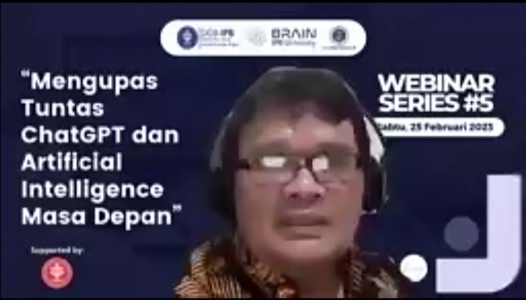Peel Through ChatGPT, Technological Advancement or Threat? This is the Professor’s of IPB University Response

ChatGPT is one of the technological developments that is currently being discussed and is popular among the general public and academics. This technology is fairly innovative and very revolutionary at this time.
ChatGPT was built by Open AI, one of the most advanced artificial intelligence (AI) technologies in understanding human language using deep learning technology. Since its introduction in 2020, the answers received by the world community have been very responsive. But along with that, there are challenges and negative impacts that are feared. For example regarding data security and privacy.
In further detail regarding ChatGPT and AI, the IPB University’s Blockchain, Robotics, and Artificial Intelligence Networks (BRAIN) Research Group, the Bandung Institute of Technology (ITB) Artificial Intelligence Center and the IPB University Agroindustrial Technology Postgraduate Student Forum held the 5th Brain Series Webinar with theme ‘Peel Through ChatGPT and the Future of Artificial Intelligence’, (25/02).
“ChatGPT technology can be utilized in decision-making but must be developed in an ethical, responsible and sustainable way. We must be able to determine the direction and method of using AI and ChatGPT in order to produce maximum benefits for the development of science and technology for society,” said Prof Anuraga Jayanegara, Professor of the Faculty of Animal Science, IPB University.
Prof Yandra Arkeman, Professor of Agricultural Industrial Engineering and BRAIN researcher at IPB University explained, the accuracy of the GPT chat output depends on the novelty of the facts. The validity of the rules also depends on the learning model used by the AI experts. So it still requires justification from humans.
“Currently ChatGPT is still not connected to the internet. If so, then the ability to update facts and rules will be faster and can even exceed human capabilities, this is something that needs to be watched out for,” he explained.
The use of ChatGPT, he continued, must be done wisely in orde to avoid chaos in human life. Human capabilities must remain superior to intelligent machines. AI scientists can play a role in discussions determining AI progress in the right direction.
According to him, there has been a global effort to regulate the use of AI technology, including ChatGPT. Some countries even have laws governing the use of AI and protecting privacy.
“ChatGPT can provide Halal fatwas, but the findings must be validated by an Ulema (MUI). Therefore we have to make our own machine that is smarter than ChatGPT. This machine will later be integrated with the existing halal information system in the government,” he said.
As a result, he continued, the use of advanced digital technologies such as AI and blockchain has become a necessity for halal information systems in Indonesia. However, humans must remain the masters of these intelligent machines. Global and national regulations are also set for its use. “This regulation should come faster than the development of the technology. Before technology arrived, regulations already existed,” he added.
In this event, Dr Eng Ayu Purwarianti, Lecturer at the School of Electrical and Informatics Engineering and Head of the ITB Artificial Intelligence Center as the second speaker also explained the mechanism and how to understand ChatGPT. (MW/Zul) (IAAS/DSR)



